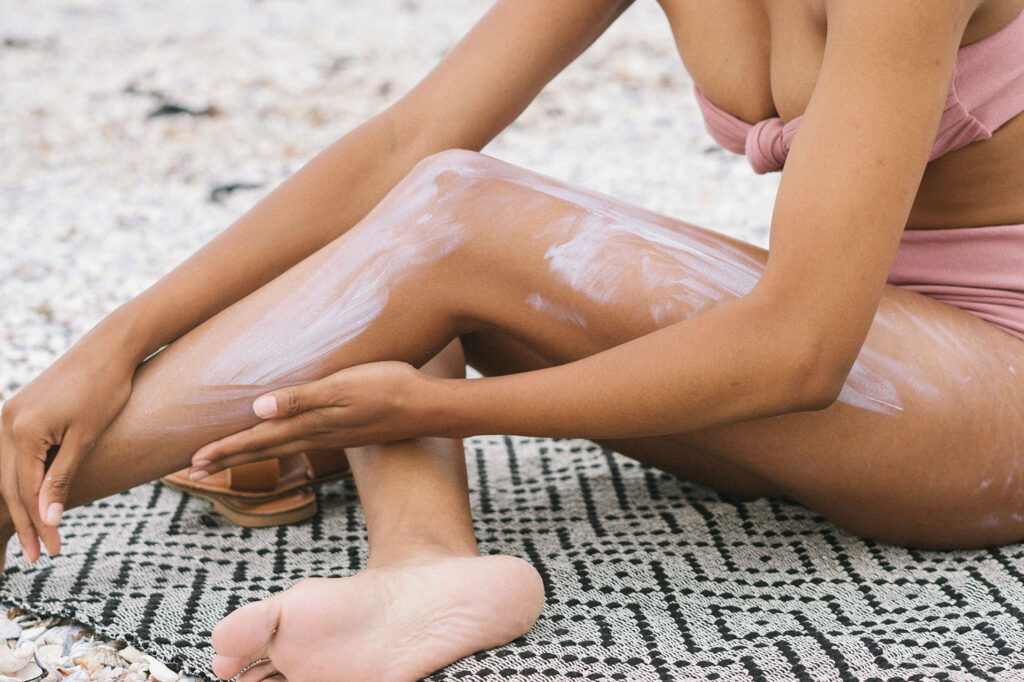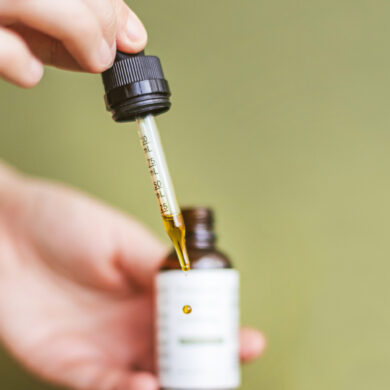Sun-damaged skin is a serious matter. We asked an expert how to protect ourselves before and after sun exposure.
Summer is around the corner and, especially after a year of sacrifices, we can’t wait to pack our bag for a holiday in the sun.
Getting out in the sun, even just for a walk around the park, is incredibly good for your physical and mental health. Sunlight releases serotonin (the happiness hormone) in your brain, boosting your mood, and melatonin, which helps you sleep.
Of course, excessive exposure to the sun without the appropriate level of protection can be very dangerous for your health – skin cancer is not a joke – and can leave you with hyperpigmentation and melasma, to only name a few.
We asked Dr Catharine Denning, Advanced Aesthetic Doctor and Medical Director at Clinic One Point Six, a few tips to make sure we are ready to catch some (good) rays.
What to do four to six weeks before sunshine
“Wearing an excellent sunscreen is extremely important, but because often you sweat it off and it only really lasts a couple of hours for the complete protection, I’d advise carrying a brush-on block in your bag so that every couple of hours, you can top up your sunscreen plus this will help mattify the skin (if sweaty or oily).
Before being in a sunny climate or going on a hot holiday, I advise avoiding treatments like peels, micro-needling and anything that could cause inflammation to the skin because the combined effects of sun exposure and inflammation can cause your melanocytes to discombobulate, and that’s when you start getting problems with uneven skin, pigmentation and melasma flare-ups etc.
I tend to ask my patients to avoid doing anything significant in-clinic before sun exposure (for at least a month before). Some doctors advise avoiding ingredients like retinol. However, as long as you are using a good sunscreen and keeping your face under a hat, retinol is fine. If you find that your skin gets very sensitive in the heat and sun, you may want to stop using retinol or decrease your frequency of use. Use less AHA and BHA type acids, and if you do want to exfoliate, go for a PHA which is better for sensitive skin.
Try not to wear heavy moisturisers or foundation as you’ll be more likely to suffer from things like breakouts. When it’s warmer, and you’re sweating a bit more, you should go for lighter, more serum-based, hydrating agents rather than heavy things like emollients – I suggest more of a hyaluronic acid-based serum. It’s the same with makeup, wearing lightly tinted moisturisers as opposed to foundations etc.”

After-sun care for sun-damaged skin
“If pigmentation or uneven skin tone is an issue, then it’s an excellent idea to start using specific ingredients for hyper-pigmentation, such as skincare that uses retinol (very important as they help redistribute the melanin in the skin). Also, try an agent that suppresses the melanocytes a bit. For example, Tyrosinase inhibitors like kojic acid, to a certain degree azelaic acid are suitable, ascorbic acid (vitamin C is perfect for brightening the skin).
Slightly more aggressive treatments would be prescription-strength options like hydroquinone – I wouldn’t necessarily say that this is appropriate for everybody to use. You have to use it under pretty tight supervision by someone who knows how to use it hydroquinone. It’s a very good agent if you find you have stubborn, deep pigments. Combining hydroquinone and tretinoin (the strongest retinoic acid) is an excellent way of resurfacing the skin and getting rid of pigmentation. If you also combine this with treatments like deeper chemical peels, to a certain degree, micro-needling can help as well – actually, you can get some outstanding results!
It’s a bit of a long journey to rectify pigmentation – it’s a condition that’s very stubborn! It’s not like you’ll ever get overnight results; you have to be patient. But these are all ingredients that are useful post-sun exposure.
If you have sensitive skin, rebuilding the skin barrier is important; ceramides, azelaic acid, and niacinamide are suitable for slightly more sensitive skin. Often after sun exposure, the barrier function of the skin can be compromised, and it’s important to rebuild that back up again.”
The importance of good hydration
“For deep hydration, Profhilo is brilliant because it’s a hyaluronic acid (HA)-based gel that’s being injected. This treatment – in combination with using lighter HA serums when it’s sunny (rather than heavier emollient based ones) – provides good deep hydration. Initially, it is recommended to have a few Profhilo treatments in quick succession (a generous load in order to stimulate collagen), and following that, a treatment every 3-6 months is sufficient.”
Dr Catharine Denning is an Advanced Aesthetic Doctor and Medical Director at Clinic One Point Six.
Images: Apostolos Vamvouras / Rf Studio


